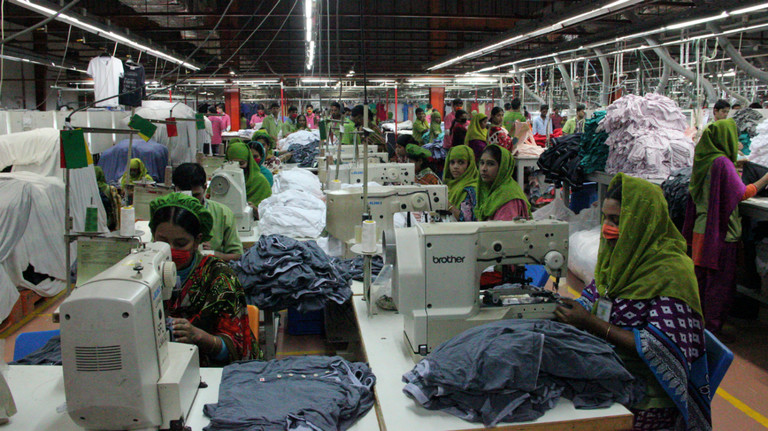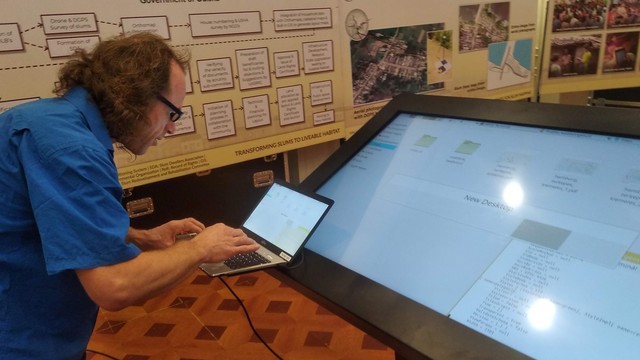The future of work, technological change and global inequality
Technical and digital innovation are transforming the nature of work, employment patterns and international trade. IIED director Andrew Norton looks at how technological change brings both threats and opportunities – and how developing countries can take action to ensure their citizens have the skills they need.


Women work in a knitwear factory in Mymensingh, Bangladesh. Increasing automation in textile manufacturing, which has increased opportunities for women in many developing countries, will have negative impacts on gender equality (Photo: NYU Stern BHR, CC BY-NC 2.0)
The world of work is experiencing dramatic disruption from accelerating technological change on a global scale.
In richer countries evidence suggests that increasing automation is not leading to the ‘end of work’, but rather contributing to stagnating living standards for most people and growing disempowerment in the workplace. For developing countries impacts arise from changing disparities of wealth and income between countries – and between people within those countries.
So, in what ways is rapid technological change affecting inequality and what emerging solutions can we identify?
Global inequality
Many Asian countries have pursued rapid growth through manufacturing goods for export to rich country consumer markets. Automation will erode this pathway, as low labour costs become less important for manufacturing.
Increasing automation in textile manufacturing, which has expanded opportunities for women in many developing countries, will have negative impacts on gender equality. And for Africa, with a high youth population, not being able to capitalise on low-cost labour to attract manufacturing investment is particularly concerning.
Developing countries can also be affected by political change in developed countries. The erosion of people’s sense of identity and security in the world of work can lead to rising nationalism and xenophobia. This tends to reduce tolerance of migration, public support for aid and openness to imports, as well as undermining support for tackling global challenges such as climate change.
Inequality at the national level
Inequality within countries can also be exacerbated by rapid changes in the world of work. Technological advances tend to increase returns to capital (the owners of the machines) and decrease returns to workers. And digital technologies provide a huge boost to highly skilled workers’ productivity in some sectors, leading to lower demand for the less skilled.
How technological change plays out in agriculture will be critical for the progress of inequality in poor countries. If automation enables agri-business to develop more profitable capital-intensive business models, the asset base of poor households may increasingly be at risk from commercial land acquisition.
Technological change affects people’s working conditions as well as the nature of their work, particularly through digital platforms that are transforming both local labour markets (taxi rides) and global ones (accounting services). This can undermine labour protections and living standards, and lead to increasing insecurity and isolation for workers in the digital economy.
Opportunities
But technological change also brings opportunities for inclusive and sustainable development.
Developing countries can leapfrog out-dated technologies, whether through pioneering innovative uses of information technology, or avoiding being locked into the use of fossil fuels in energy and transport. Kenyan businesses, for example, pioneered the use of mobile money with many benefits, including helping migrant labour remittances reach intended recipients reliably.

While poor countries stand to lose access to rich country markets as industrial production gets ‘re-shored’, global digital platforms for services such as accountancy and copy-writing might enable workers in developing countries to directly access work opportunities in developed countries.
Emerging solutions
None of this is inevitable. Policies and politics can also determine the outcomes of technological change.
Education policies can ensure that people throughout the workforce have the skills they need to cope with rapid change. These skills are not only technical. Automation will not do away with jobs that require human creativity, empathy and communication. There will also be opportunities to draw on digital technology to improve access to the highest quality of education on a global scale.
Developing countries will need to build on their economies’ strengths as the industrialisation route to growth becomes harder to achieve. This will mean making the most of their assets – whether in terms of abundant natural capital or an informal sector with many dynamic small-scale entrepreneurs.
In agriculture, if family farms can access micro technologies, such as drip irrigation and drones, then their productivity can match new highly automated agribusiness models that will quickly spread from the north to the south. Without such efforts countries may not just lose their smallholder farmers, but also the bulk of rural livelihoods.
Social protection schemes will have to support people as they manage the resulting life changes. Public works schemes such as India’s Mahatma Gandhi National Rural Employment Guarantee Act can enhance incomes of the vulnerable while building local infrastructure. Recent work by IIED shows how this scheme also works to preserve the local environment and can enhance resilience of poor households to the impacts of climate change.
While the new global digital economy will create opportunities for flexible working through on-demand platforms, without regulation or effective collective action by workers there is a risk of a race to the bottom in pay rates, eroding possible benefits to workers in the new global digital economy. This will be one of the key challenges for workers and governments if rising inequality is to be avoided.
Many policies that will be needed depend on a sustainable tax base. This will be challenged by technological change, including new mediums of exchange such as crypto-currencies created independently of governments.
Technological change can create economies that are more sustainable and inclusive. But this will not happen without effort and action. To realise the promise we will need citizens who can demand a future that works for all and are properly equipped to engage with a changing world of work, politics and policy.
This article was orginally posted on the G20 Portal.
About the author




